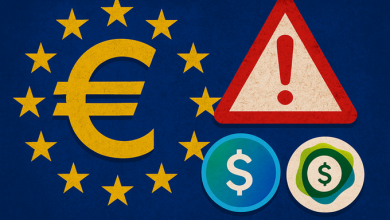South Korea Expands Crypto Crackdown to Cold Wallets in Aggressive Tax Enforcement

South Korea’s National Tax Service (NTS) is escalating its crackdown on crypto tax evasion, broadening its enforcement powers to include the seizure of undeclared digital assets stored in offline cold wallets. The move underscores Seoul’s growing determination to close tax loopholes in the digital asset market and strengthen compliance amid a surge in crypto trading activity.
According to reports published on October 10, the NTS now has the authority to seize cryptocurrencies even when stored in cold wallets—devices not connected to the internet—if there is evidence of tax evasion or concealment. Officials confirmed that home searches could be conducted to uncover hidden digital assets, citing the National Tax Collection Act as the legal foundation for these operations. The announcement comes as part of South Korea’s broader efforts to enhance transparency and accountability in the crypto sector.
Expanding scope of enforcement
Data from the NTS reveals that since 2021, authorities have seized and liquidated roughly 146.1 billion won (about $108 million) worth of cryptocurrencies from 14,140 individuals and entities who failed to meet tax obligations. Officials say enforcement actions are intensifying each year, reflecting both the rise in the number of crypto investors and the growing value of assets traded on South Korean platforms.
By August 2025, the Financial Intelligence Unit (FIU) had recorded around 37,000 suspicious transaction reports—surpassing the total combined figures for 2023 and 2024. The increase is attributed to the expanding base of crypto investors, which now includes nahead 11 million South Koreans. This sharp rise in flagged transactions suggests that tax authorities are deploying more sophisticated analytics to trace digital asset flows and detect irregularities.
Government doubles down on regulation
The South Korean government has steadily introduced tighter measures to monitor and regulate the cryptocurrency market. Recent updates include enhanced know-your-customer (KYC) procedures, mandatory tax disclosures for platforms, and stricter anti-money laundering (AML) oversight. The inclusion of cold wallets in the NTS’s enforcement framework represents the next phase of this regulatory tightening.
Authorities have expressed concern that some high-net-worth individuals have moved significant portions of their crypto holdings offline to avoid detection. By bringing cold wallets under scrutiny, the NTS aims to ensure that all taxable digital assets are traceable, regardless of storage method. Officials are also considering legislative updates to strengthen transparency in ownership reporting and cross-border tax compliance.
Industry observers say the NTS’s expanded enforcement could set a global precedent. As nations struggle to adapt tax frameworks to decentralized finance, South Korea’s approach—combining data analytics, inter-agency coordination, and legal enforcement—may become a model for other jurisdictions.
SEO analysts note that South Korea’s aggressive stance highlights its position as one of the most proactive regulators in the global crypto space. With new taxation frameworks scheduled for implementation in 2026, the NTS crackdown sends a clear signal: cryptocurrency income, whether held online or offline, will remain within the reach of the tax authorities.
The intensified oversight is expected to reshape how investors manage their digital portfolios and could influence global regulatory standards for crypto asset taxation. As South Korea reinforces its image as a leader in crypto compliance, other governments are likely to watch closely and adapt similar strategies in their own tax regimes.







